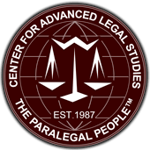
|
Tina Ghanavati Director of Career Services Center for Advanced Legal Studies |
(Note: This is the second of two articles on preparing an effective resume and cover letter to assist you in landing a paralegal job. Go to Creating a Powerful Resume to review the 1st in this two-part series.)
The assembly of a paralegal resume doesn’t differ much from other resumes as far as basic content. However, as expected, the focus should be directed to your paralegal education, experience, and the skills that transfer well into the legal profession. Let’s review each section of a paralegal's resume in detail.
Education: This section is an important part of the resume for those entry-level paralegals who have just completed their paralegal program. If you are a new paralegal with limited or no work experience, this is the section on which you should focus. Specify your paralegal degree or the paralegal certificate you completed, the college from which you graduated, and your graduation date. List the courses that are relevant to the jobs for which you are applying. In general, law firms seek prospective employees who have skills in areas of legal research and writing, litigation, and civil procedure. This is also where you should share any academic achievements, such as graduating with various honors or awards.
Experience: If you are a seasoned paralegal, this section should be the meat of your resume. You should describe your areas of practice, the types of matters you worked on, the specific tasks you performed, and your job responsibilities. List each entry employer by employer with the dates for each in reverse chronological order. It’s best to detail your job duties, and don’t forget to use those action verbs!
If you’re a newly graduated or certified paralegal, you probably have more experience than you think. This is where you can list externships, as well as any volunteer work you may have done with a law firm or other entity seeking legal assistance. For each position, include the name of the employer, date of employment, your title and a short description of your responsibilities. Unless you had a "career" before you became a paralegal, or you had a job related to law or your current area of practice, do not give a long description of your pre-paralegal jobs. If you decide that you need to describe your pre-paralegal jobs, be as brief as possible. The more attention you give to non-paralegal experience, the more you detract from the experience in which the prospective employer is interested.
Skills: This is your opportunity to showcase any specialized or technical skills you may possess. Are you proficient in Excel, Power Point, Outlook, Photoshop, or html coding for web pages? Do you know how to navigate your way around legal search engines and research sites? Can you speak and/or write in another language? Do you have public speaking experience? Whatever skills you may have, this is the section to highlight them.
References: Do not list references on your resume. Your references should be listed on a sheet of paper that is separate from the resume. Make sure to contact each individual who you are asking to serve as your reference and secure his/her permission in advance.
Cover letter: Once your resume is prepared to your satisfaction, you should work on developing a cover letter format. Although cover letters should be personalized to the position you’re applying for, you can create a general outline to follow for each letter you write.
As with your resume, your cover letter should be error-free and concise, not to mention well-written. This is where you can show off your writing skills with a persuasive, impactful style. The letter should explain why you’re applying for the job and then focus on your particular strengths and skills and how they can apply directly to the job you’re seeking.
In the final paragraph, thank the employer for considering your application and let them know the best way to contact you for an interview.
If you would like to learn more about how to prepare yourself for a successful paralegal career, visit Center for Advanced Legal Studies at www.paralegal.edu. Since 1987, Center for Advanced Legal Studies has trained, graduated, and helped thousands of students enter the paralegal profession.












